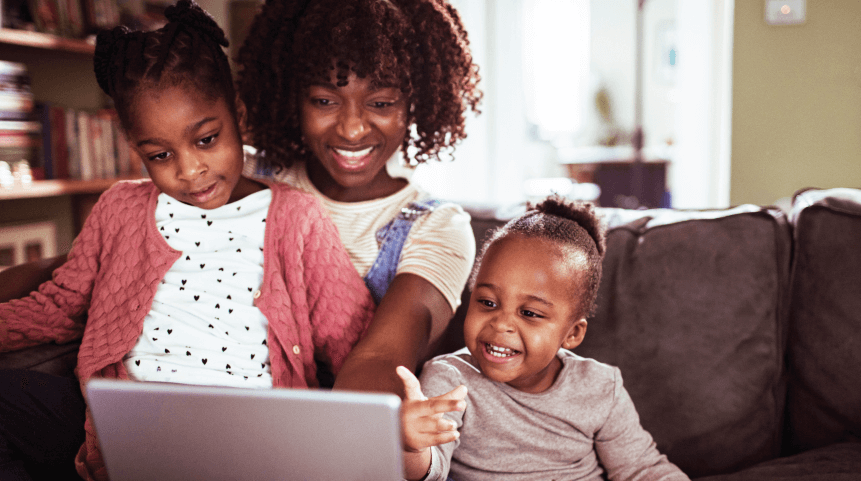One year in, the COVID-19 pandemic has changed our lives in ways too numerous to count. It has also intensified some debates that pre-dated the pandemic. Others have been relegated to the sidelines, at least for the time being.
Discussions about screen time have been lively for years. That’s especially true for conversations about screen use by kids and teens. But the conversation has shifted a bit during the pandemic. That’s because, for many of us, our social experiences now take place primarily on our devices.
With in-person interactions carrying some risk, screens have become one-stop shopping for many of our needs. They will likely continue to be an acceptable but imperfect option for many of us, even as outdoor activities become more viable in the warmer months ahead.
But big questions remain: What effect is all this screen time having on us, and on young people in particular? Is it okay that their social lives are so screen-centric? And what do healthy screen-time habits even look like during a pandemic?
It’s important to remember a few things when considering these questions. First, social experiences are a basic human need, not a luxury. Loneliness in kids and adults has profound effects.
Despite their flaws, screens can provide access to social experiences and can be a useful tool for meeting those needs in our current situation. They can be a means to an end that’s essential to mental and emotional well-being.
Second, many adults are seeing their own screen use skyrocket. This has been a challenge for everyone, so insistence on restrained screen usage for kids can feel a bit strange. After all, who among us didn’t love pouncing on perceived double standards when we were kids?
Finally, we’re still learning about the effects of screen time. The science is far from settled and research continues to unfold. There are plenty of theories and correlations, but definitive conclusions have been elusive in this relatively new, fast-changing area of study.
Recommendations and best guesses do exist, though. The American Academy of Pediatrics recommends no screen use for children younger than 18 months (other than video chats), adult-guided use of high-quality programming for children 18-24 months and firm limits for children older than two years.
More detailed information from the AAP can be found here and here, including a Family Media Plan tool. The American Psychological Association also has a comprehensive overview of what we really know about kids and screens, and what questions are still being explored.
Still, screens can support social connection and provide kids with the safe and engaging social experiences necessary for healthy development. The benefits are even greater, particularly for very young children, when a caregiver serves as a media mentor and helps them navigate a game or app, or even plays with them!
So, whether you’re looking for kid-friendly ideas about how to connect virtually, high-quality materials that spark social experiences, or just looking to learn more about the importance of social connection, the Library has you covered.
Looking for screen-free options to help scratch the social itch? Check out:
- “Screen-Free Fun: 400 Activities for the Whole Family” — This collection of activities offers wide-ranging and engaging ideas for indoor and outdoor family fun.
- “Let’s Clap, Jump, Sing & Shout; Dance, Spin & Turn It Out!” —Patricia McKissack compiles a treasury of African American children’s culture: a collection of her favorite childhood games, songs, poetry and stories that are directly linked to her African American heritage. You can also check out this title as eBook on OverDrive/Libby.
- “Unplugged Play: Grade School” — Curated for 6-10 year-olds, this collection of games and activities includes options for both group and solo enjoyment.
If you’re looking for social experiences on screens, you may already know that the library circulates games. If you have the necessary console, check out:
- “Team Sonic Racing” — Fans of “Mario Kart” will enjoy this notably teamwork-focused racing game that allows for both local and online multiplayer. Teammates can share items, power-ups, and boost paths as they speed to the finish line! Also available on PlayStation 4 and Xbox One.
- “Stardew Valley” — For a slower-paced and more analytical social experience, share responsibilities with up to three other people as you build and sustain a farm in this comforting, endlessly replayable game. Also available on Xbox One.
- “Moving Out” — Flexibility, clear communication, and a sense of humor are necessities for this frantic and hilarious bit of couch co-op chaos where up to four players must work together in increasingly ridiculous moving scenarios. Also available on Nintendo Switch.
And if you want to learn more about the importance of social experiences and connections, check out:
- “Together: The Healing Power of Human Connection in a Sometimes Lonely World” — Written by a former U.S. Surgeon General, this book presents loneliness as a significant public health issue and underscores the importance of community and human connection.
- “Friendship: The Evolution, Biology, and Extraordinary Power of Life’s Fundamental Bond” — Science journalist Lydia Denworth explores the roots and functions of friendship as she details the essential role these relationships play in our lives.
You can sign up for a free library card here. If you are new to our eResources, check out these tutorial videos on how to get started. If you have any additional questions, you can contact a librarian through Facebook, Instagram or Twitter. You can also call us at 412.622.3114 or email us at info@carnegielibrary.org.

